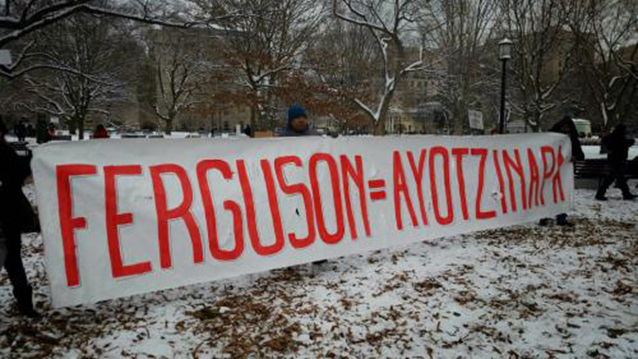by Dan La Botz
January 9, 2015
President Barack Obama received Mexican President Enrique Peña Nieto in the White House on January 6 where the two men reportedly talked principally about economic affairs, security issues related to the international drug cartels, and immigration issues. But in front of the White House some 200 Mexican Americans demanded Peña Nieto’s resignation for his handling of the killings and kidnappings that occurred in Iguala, Mexico, in September.
The protestors who had come to the White House from Mexican activist organizations in Washington, D.C., New York, Philadelphia, North Carolina, and in one case as far away as Kansas City, as well as a small number who came from Mexico, chanted slogans and held signs and banners demanding justice for the 43 kidnapped students of the Rural Normal School (teachers college) of Ayotzinapa, Guerrero. Some carried sticks topped by flowers with a portrait and information about each one of the 43 missing students.

One woman speaker said, “We are here to demand justice for the Ayotzinapa students, but we demand that Peña Nieto resign.” Other speakers talked about the more than 100,000 deaths and 20,000 disappearances resulting from the Mexican government’s war on drugs during the presidencies of Felipe Calderon and Peña Nieto, about the Mexican government’s corruption, and about the authorities’ impunity. Periodically the protest demonstrators counted up from 1 to 43 and shouted, “They were taken away alive, and alive we want them back.”
The protests began at 9:00 a.m. with a march through Washington, D.C. neighborhoods to the White House and continued there until 3:00 p.m. When at the end of the meeting with Obama, Peña Nieto left with his entourage, the demonstrators chanted in Spanish and English, “Asesino! Killer!” During the protest musicians played and sang songs of protest, while a group of indigenous dancers from the Ayotzinapa New York Coalition performed a traditional dance and indigenous religious ceremony.
Following the protest about 70 people from the various city and state organizations gathered at the St. Stephen & the Incarnation Episcopal Church to discuss the next steps for the Ayotzinapa solidarity movement. While no firm final decisions were reached, the solidarity activists talked about the possibility of taking the case to the United Nations, of a tourist boycott of Mexico, and about other forms of protest and pressure. The Ayotzinapa activists pledged to continue and to build the movement in the New Year.
In Mexico the movement for justice for the Ayotzinapa victims and their families has called for a national and international day of action on January 26.
Dan La Botz is a member of Solidarity in New York and an editor of New Politics, where this article previously appeared.
